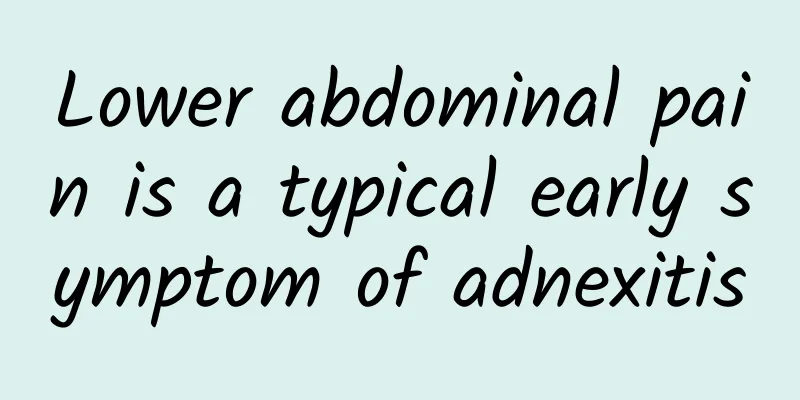How long does it take for pelvic inflammatory disease to heal after taking medicine?

|
How long does it take for pelvic inflammatory disease to heal after taking medicine? This depends on the severity of the disease and individual differences. Acute pelvic inflammatory disease usually takes a week, while chronic pelvic inflammatory disease may take weeks or even months. 1. Treatment of acute pelvic inflammatory disease Common symptoms of acute pelvic inflammatory disease include increased vaginal discharge and lower abdominal pain, especially during menstruation, which may cause increased menstrual bleeding and prolonged menstruation. Doctors usually recommend antibiotics for treatment, such as amoxicillin or cephalexin. In most cases, symptoms will improve significantly after one week of medication. During treatment, you must strictly follow the doctor's instructions and avoid stopping the medication on your own to prevent recurrence of the disease. 2. Treatment of chronic pelvic inflammatory disease The treatment of chronic pelvic inflammatory disease takes a long time, which may take two weeks to three months or even longer. The treatment method is not limited to medication, but may also include comprehensive means such as physical therapy. In this case, patients need to be patient and maintain close communication with their doctors in order to adjust the treatment plan. Chronic pelvic inflammatory disease may affect the quality of life due to its recurrence, so early intervention and continuous treatment are particularly important. 3. Factors affecting treatment time The treatment time for pelvic inflammatory disease is related to many factors, including the patient's physical condition, immune status, and the severity of the disease. Some patients may be sensitive to certain drugs and recover faster, while others may need longer treatment. Good living habits and diet can also help speed up recovery, such as getting enough rest and eating nutritious foods. 4. Prevention and care recommendations In order to prevent the recurrence of pelvic inflammatory disease, you need to pay attention to personal hygiene in daily life, especially menstrual hygiene. Regular physical examinations can help to detect and deal with problems in time. Avoiding excessive fatigue and stress and maintaining mental health are also important measures to prevent pelvic inflammatory disease. In terms of diet, eat more foods rich in vitamins and minerals to enhance immunity. 5. Communication with doctors During treatment, it is very important to maintain good communication with your doctor. Any discomfort or changes in symptoms should be reported promptly so that the treatment plan can be adjusted. Patients can also ask the doctor for suggestions on lifestyle adjustments to help them better cooperate with treatment. Through these measures, patients can not only better control their condition, but also improve their quality of life. If you have any concerns or symptoms persist, be sure to seek medical attention in a timely manner and get professional guidance and help. |
<<: How much harm does abortion do to women?
>>: Drinking water boiled with basil stems can cause miscarriage
Recommend
Eat pumpkin to lose weight. Learn these three recipes easily.
[Key Points]: Pumpkin is nutritious and healthy, ...
Explain the causes of pelvic inflammatory disease in detail
Nowadays, people's pace of life is accelerati...
How many days do you usually take progesterone to induce menstruation?
Progesterone is usually taken continuously for 10...
What exercises can control the growth of uterine fibroids?
Moderate exercise can help relieve the discomfort...
Causes of vulvar leukoplakia in life
Vulvar leukoplakia is a common disease in life. W...
The harm of uterine fibroids to pregnant women
Many women are often found to have uterine fibroi...
What are the symptoms of multiple uterine fibroids? What are the typical symptoms of multiple uterine fibroids?
According to the different pathology of fibroids,...
Why do patients with uterine fibroids experience amenorrhea? Does uterine fibroids cause amenorrhea?
Why do patients with uterine fibroids experience ...
Experts explain the precautions for treating Trichomonas vaginitis
Trichomonas vaginitis is a very harmful gynecolog...
Can I use air conditioning during a miscarriage?
It is okay to use air conditioning moderately aft...
Eat lettuce salad for antioxidants, and add an egg for better nutrient absorption!
In the cold winter, after eating too much greasy ...
Too little sleep may trigger your fat gene
Do you always feel that you don’t get enough slee...
What to do if you have an ectopic pregnancy
What to do in case of ectopic pregnancy? Now ther...
Obesity accelerates, causing cellulite to appear on thighs! 3 tips to effectively eliminate cellulite
Summer is here and more people are going swimming...
Getting up at 8 o'clock in the morning and basking in the sun is good for weight loss! A helping hand for a good metabolism
Do you prefer to get up early in the morning and ...









